
States of Poetry New South Wales - Series One
Series One of the New South Wales States of Poetry anthology is edited by Elizabeth Allen and features poetry by poems by Susie Anderson, Pam Brown, Toby Fitch, David Malouf, Kate Middleton, and Fiona Wright. Read Elizabeth Allen's introduction to the anthology here.
I love the whole world
she said,
without sounding
corporate
(Agnes Martin
said it)
I love arctic phlox
but
have never seen it
*
a bit 'light'
on equipment –
a T-square
& a tape measure
might need extra
for researching
to avoid
grains of salt
*
(an ascription)
Agnes Martin
was a lesbian
tho
she often
denied it
wonder
how her lovers
took that?
*
&, now,
a new question
it's
for Moe Tucker
(Velvets drummer)
why why
the Tea Party?
furious
about the way
we're being led
towards socialism
(Moe Tucker
said it)
no no no Moe
'we're' not
&
that's the trouble
politics though
can happen
ominously,
with what
between
the rich & the socialites
& technology
couldn't play
a perfect roll
for a million dollars
moody
cymbals
never mattered
*
Agnes Martin,
had she lived
long long long,
might have been
Tea Party
her capable paintings
put me
to sleep
(reproduction only)
making a map
of hints
& clues
you'll never know
what
abstraction
is
unless
you ask
the women
*
I dream another grid
Pam Brown
to think the
future
I've
always had
frugal expectations
thinking
what cannot
be thought
trickgensteinian
*
everyone's
been to Paris
or claims it
where influences
live
& teach
& children
lift giant leaves
& blow
fluff
*
start to loathe
the sun's
shrivelling
affordable viola
planted
for cheer
wilted
even the sun has cancer
(norma cole)
*
singed
no
signed
repurpose
funding
get
brand poetry t-shirts
rain taxi
book thug
I ate all your bees
*
noodle bowls
trestle table
white cloth
pristine, cool
embroidered edges
lidless jars
potent chillis
fresh bean shoots
mint
*
nothing
'under the bed'
just dust
& a five cent piece
*
I don't give a
*
windows
rattling
blind cord bead
tap tap
a southerly
what's there to say
you went away
twice
you didn't die
*
money
language
time
electric money
safekeeping
beyond panic
an ethic
an epic
writing
to say
hooligan affection
takes up
all
the time
*
standing waters
watery metaphors
persist
putrified slime
mites
mal aria
misaquaterrists!
forbidden swamp
filthy mire
nether regions
fountains of youth
marshes
ague
*
'thinking with'
undoes
things
&
the future
talked past
Pam Brown
someone is leaving a plane and feeling the city wrap around them again. the atmosphere, it is always heavy around here. what that means is that it's humid. within the person there is an internal battle, then there is a decision, then there is action. while the consequences of the action play out, crickets play and not even in the background. the sound rises and all of a sudden it feels like they are all around. but they are nowhere to be seen, so it is terrifying as well. something invisible can be so consuming. yes, the atmosphere is still heavy here. the person who leaves the airport had no one to meet them and was going to get the airport train but figured a taxi wouldn't be so much more expensive than the train fare. it was probably about two dollars more. this is the kind of person who has to wait to run errands that would be easier with a car because she doesn't have one herself. they wait until a friend with a car has a weekend free. this is the kind of person who leaves their phone at home and goes to dinner with only a book. they like to walk home through back streets to explore the city, stop to pat friendly cats for a little while and dawdle all the way back because it is always good to go a bit slower. the noise of the crickets, the absence of a breeze wrapping around all the time make this giant place seem smaller.
Susie Anderson
Recording
at the patisserie the waitresses speak in French to each other while they slowly put in your coffee order. they do not seem rushed and their dialogue makes the experience seem authentic. I did not have cash and asked if they had a minimum on card. it was $10 and I had to add a chocolate truffle to my order to meet the price. I laughed to deflect attention from getting chocolate in the morning and said it would be my afternoon snack. I was lying. I planned to eat it well before lunch on the way back to my building so no one I work with would know. on my way back I realised that no one actually speaks to each other at the office. so I could eat what I want or sit and write the whole experience down in my notebook at my desk and no one would notice.
Susie Anderson
Recording
on the first night
coo coo cooroo
falsetto blues singer
blinded by the hurt
coz I'm
blinded by the hurt
troubled refrain
slowly building
backing singers
it's intersubjective
I
join them
coo coo cooroo
blinded by the hurt
repeat
*
anti day
everyday
partly cloudy
in Wiley Park
Jan
'taught the Beats'
to a secular mix
at Wiley Park
Girls High School
after her job
on Tribune,
communist newspaper
here am I
in
the train
'this train
will stop
at
Wiley Park'
Jan
& her whiskeys
& crime novels
*
the way
cloud
banks
*
this sign -
do not visit
after heavy rain
risk of tree failure
glue gum
eucalypt haze
blue gumski
karrabin
bundjalung
red gum
*
I can't
help you
*
third floor -
is every woman
on the third floor
here
for a mammogram?
*
there
a little poem
tucked
at the end
of the lifestyle supplement
just a bit bigger
than
a horoscope chunk
to give it its due
*
I can't
help you
*
going going
koala
powerful owl
gang gang
coo coo cooroo
*
documentary –
the teabag tag
jiggler dangling
from
Noam Chomsky's
cup
endearing
*
troubled refrain
real life
tastes plastic
anyway
repeat
Pam Brown
she used to walk out to the road at the end of town, put her arms and legs up to the sky and stretch out to reach all of the stars. the next summer it seemed like she would never have the chance to do it again, because of the locusts. everywhere in the town there were dead locusts covering the roads. locusts met their deaths on windscreens of cars and meshed inextricably into the grates of the trucks on the highway. the people in town stayed indoors most of the time because you could not go outside without breathing in or stepping on a locust. elderly people raised their eyebrows at the young as if they were receiving their penance. the middle-aged accepted the locusts as another weary feature of their lives. the young checked the weather on their phones and knew there was a 80% chance a rain storm would come and wash the locust carcasses away by next thursday.
Susie Anderson
Recording
the riot marches down pour lemonade into yr filters
watch it fizz w/ the aura of philosophy
confit the poor toys & velour lining yr demon crèche
where right wings cook the science left wings wilt
where the schism u imp about cycles & the ex u con
script says au revoir! it’s get on or get off if u
serf on ice / sir vice the military exploit the monstro
city in yr self & yr peak industry body perks apply!
it pays to be Trumped up logorrhoeathmic crazed ex
ponent of that power to witch re volting masses stick
aux! centre yr cynic for some scenic prostitution
pawn off yr core values & move evr forward evn
the fixed come unfixed as iphones on the blink keep
snuffling the paywalls’ patois paths so logical
it’s tough love u illuminate swipe right
eat the drapes eat everything night drips w/
Toby Fitch
Recording
I am always on the edge of being careless. if I am leaving a table at a bar, for example, people always remind me to pick up my phone or my wallet as opposed to forgetting it. it is kind that people care to remind me. leaving the bus I didn't have enough time to do my checklist, which involves locating important items like my Opal card, wallet and phone. after I got off I knew I didn't have my Opal card. I looked fervently through all my bags anyway. I took out my wallet and my phone and my diary and shook my books by the spine to loosen the pages. my efforts only revealed a lack. it's an old habit to cling and lament things that are lost, but I suspect that habit also drove off on the bus along Military road. I am surprised at my ability of letting go.
Susie Anderson
Recording
daze of body & soul come to a / won’t come to an
end on this / the last night of dearth
browsing eBay & Etsy / the Cloud i erode
drops in & butts out like a tide
u appear in my inboxed head eating snow
eggs & depression for dessert as if
Bondi Beach were fatigued of its breathing
unsound government ships the crowds
back off into knots i glance at
the sea / poles flip & newspolls murk / spill
over/ as vague as a wave it is
career weather for doze who believe He loves us
all in the choked capital of wherever
i / u / our brain didn’t go
looking for grief after noon / it found us
in the form of an algorithm that could remember
& dismember our feeds / our new dream
scrolls in reverse that echo
(according to music vids & some fat
graphic lips in a txt)
the future consumption of everything before it’s even
been munched thru like ancient gums
suffering Hillsong yr funding’s been
approved by the Ministry for Excellence /
Spirit / __________ but mate
it cannot be redeemed for bodily release
in the Cross shutdown by new police power & assumption that
our impact on the environment won’t be felt
out there in the multiverse
apparitions behove themselves as certain
heads of state racing long into action deferred
mouthing out confected norms as swift & whimsical as
horses for courses men continue to fall from
the sky caused Obama anger / joy /
guilt told a story factoidally
something about the seven plots of our Hadron Collider
existence looping round like hope /
happiness / liberty / __________
but the feelings downloaded got stuck in
a sinkhole / promises resounded
& the earthworms began to travel w/ tradition again / asking
do u remember yr body or bodies
curled up together / wanting to buy for a long time
machine that can fatalise any experience there is/was no terror
that couldn’t be franchised out for all the purple
warming into peepholes online
the storm-rented sky/sea became stationary
another perfect accident for sadness journos to parse out over
the future’s raging culture wars that u & i trouble
for a fleeting exit strategy to the current
maze we fund ourselves in
& numb to the looming crash of
summer / winter air
delicate explosions that fall foam & home
in on the present w/ a superinhuman
affection / pure surface
Toby Fitch
Recording
all of the businessmen are pleased to be outside on their lunchbreak. young men looking slightly awkward in suits reminds me of a past lover and I assume I will make this association for the rest of my life. I am always more ready than the men I meet. the clock in the arcade has the inscription above it 'time conquers all'. you could live by such a maxim, I daresay.
Susie Anderson
Recording
Strange, that there are sequences
we live as cinema, if I looked
over my shoulder
I might recognise the front wall
of my bedroom
opened out towards the camera,
my furniture as hollow
as a stage prop. I am
vicarious to myself: strange,
that sometimes
we recognise significance
instead of burning it back in, much later
and imperfectly.
Some nights I wake up
gasping at the air, I dream
I'm trying, through my sleep
to speak,
to call your name
from the wet depths of slumber
but I can't will my mouth
to move: if we are unknown
even to our selves
how can we try to hold each other
still? I sit against
the bedhead, my knees
press against my breasts. Outside
are stars, a car door slamming,
the last train shunting back into the depot.
Fiona Wright
Recording
her temper tanty's sus but your mites say sassy
's entering the pleather dome lookin'
poised w/ noose & savvy much obliged to
glorify her cunning firm & tout
its nous for oblivion
where the pert velvet diva never lets you rest
your glass head in which infinite
pools rotating w/ lust
voice toots from the comments field
dissing your angel
figuring abject horror & austerity
measures your crotch slave reared as an infant's souvenir
you stick a bandaid over & own to pervert the
curse of just eyes commerce purrs w/
amour whenever you feign amen
to her abortion you think of Maldoror
honour dents your lava
humbles the dead science of your hairy elephant
violence so reset the dementors
to aim at corporations
her competition in the night sky neuters your who-man
fate reconstellating into dignified rendition
ancient & harmonic it's the
pumiced land! where serum is eeked out
& for the phone of it you make a meme of your self
sharing w/ electric fingers
this poison in your veins to maintain
cut & comb again the veneer her elegant
perm foils you parry & cite
though technically it's lice marbling your corpse
in back alleys they clack like louvres bare-backed
freaking out in a chevvy touché
ah man she's beaut but what an omen: bored
ouija face terrific rack atrocious fan fare all point out
how bent the moonbeams
Toby Fitch
Recording

Toby Fitch
'In Fancy' was first published in The Bloomin' Notions of Other & Beau by Toby Fitch (Vagabond Press, April 2016)
Recording
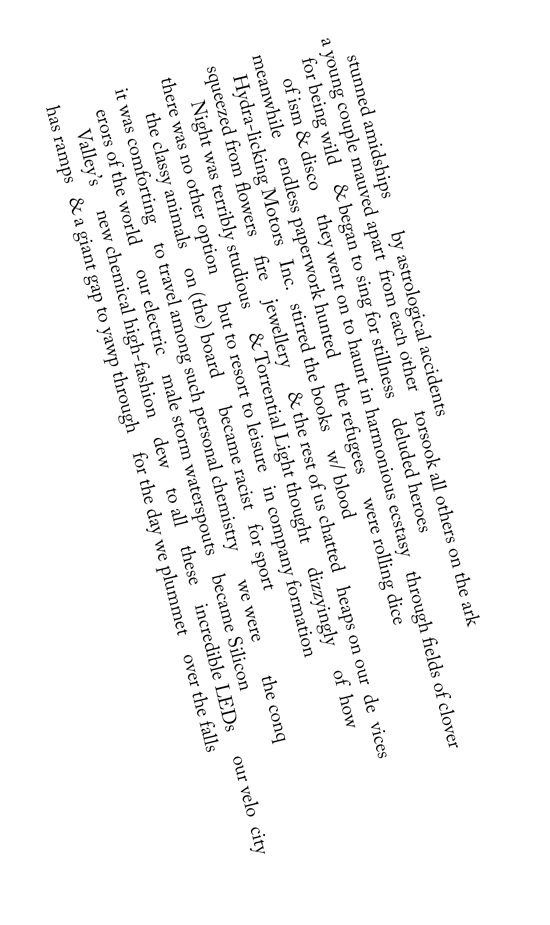
Toby Fitch
Recording
Today in Sunday weather grevillia leaves
in turmoil, no evident breeze. A sugar hit. A honey
-eater, upside down at tilt and tumble.
The body also in Sunday mode. The mind
idling on automatic with no need
to be occupied or coloured, having come at last
to the end of a long apprenticeship in learning to leave
well alone. No empire to account to. No
account-books to square. The anxiety of nothing
in hand, nothing in prospect, set aside for
a bird in a bush, just one, warm air at play
in the windchimes; whose only news is that our missing
sea-breeze has clocked in, and from further
off, instant, astir, the air-borne voices
of children in a world all swing and seasaw.
David Malouf
A soft October morning,
adagio sostenuto. Some part
of me is still delayed
in sleep. It is one with
night, with daylight
stars, moths that fumble
at a window pane, bewildered
that this tract of sky,
like no other, will not yield.
The coffee cup, double espresso,
is deeper than it looks.
Each sip I take
a dark reaffirmation.
A practice
run for the big sleep.
David Malouf
after Horace, Odes I, v
What slim-hipped beachboy dripping
with musk is riding you
now on a bed of roses
in your snug den, Pyrra? Is it
for him you have braided
those honey-gold locks
in a knot so neat, so
homely? One day
soon, black moods, black
looks, he'll be cursing
you and the fickle
gods who have dropped him,
but for now he's
hooked, you're his, all this
is for him:
calm seas, endless horizons.
Well tides,
as we know my precious,
can turn. These trophies
I've hung on the clubhouse wall
speak for one
man in his golden prime
cruelly dumped
and broken. A warning to all.
David Malouf
Sweet nothings in our ear
cherub pumpkin dearest chuck
but to the heart which is the better
listener the password
to a tongue that only two in their comings
and goings have access to
A blessed mouthful
Drawn from a stream that is forever
fresh and on our lips forever
true however
casually we call
upon it to speak for what we have no other
words for
What we catch
at a glance or in a breathless
moment
what catches
us at the first
touch
David Malouf
I was woken at some hour
of darkness before dawn by a scent so heavy
on my senses, on the room, that I was convinced
a burglar had broken in
and was loitering
upstairs or in the hallway, or having caught
my step on the stairs above him was lying low
in the laundry, or sitting
upright and unbreathing
in one of the Windsor chairs, unaware it was
his scent that betrayed him.
I checked the door to the balcony, then the door
to the street with its double lock. In the dark front room I checked
the sofa. Stretched full length
on its French blue he'd be hard
to detect. No one was there
but the scent was overpowering. 'What kind
of scent?', K would enquire
at breakfast. 'Was it
musk? Was it pine?' 'No, something sweeter – why
do you ask? Something sharper, maybe cheaper.'
'Because that would tell us,' he told me
seriously, 'what kind
of angel you were visited by.' 'Here?'
I protest. 'In Myrtle Street?' 'Why
not?' I took it in. Sometimes I wake to the smell of coffee
being brewed downstairs. It wakes me. Why not
the smell of an intruder?
When I woke again the scent had faded. What
had not was the change I felt
on my skin, on my nerves.
Later I worked for an hour or two
at my desk, struggling with angels
of another sort, who leave
no trace I would call a scent. Of musk or sweat,
or pine. Only pen-strokes on a page
they have changed with their lingering, when they deign
to linger. Or a dazzling
blankness when they do not.
David Malouf
The storm blows you back
its funnel ardent
its wide hungry eye
Its tongue croons you
onto flatline of prairie
When poppies drowsed you
red breath drew
gravity into your limbs:
you yearned for tall grass
a narrow tunnel
of consciousness brain
heart sharp, nerve
Migrant loess skims west
You root back into plain
– Call this home
– Call this no place
Ground glows like ruby
dense and knotted
as blood
Kate Middleton
The dawn is only a thought.
The fulcrum on which we rest our newsprint, our toothless fingerprints, our balmy Paxil days.
Only a thought of the windy, dwindling kind.
Wake to urgent messages, to the waltz of hours crisp and fragile as thin pastry. To roulette of lightning yes. Of arid no.
Kate Middleton
The ‘greate fyshe’, terrible
colossus, dark cathedral of days
and nights, arrests
lost Jonah in his flight. Three
days and nights spent
in wet earnest prayer, dread
dowse of whale’s
appetite, drowse of oceanic
will. It is a liturgy
of krill. A pinwheel spun
in blur of hope, despair.
The shroud of stomach’s wall,
grave chamber, draped
in sacred bile. Three days lost.
Three nights. Till their
cadence, amen, resolves.
Kate Middleton
Cut out a sixth of the heart.
At a day old—furless,
close-eyed, resembling nothing
so much as an infant's thumb—
he can survive it.
The mouse can regrow that missing part
in three short weeks.
Aesop knew it:
to be mouse-hearted
is as good as wearing
the swagger of lion.
His heart
perhaps the size of a Lilliputian walnut.
Barely a mouse, already
ripped apart.
He does not wait
for a Godhand to put him back together.
Alone he blindly furrows toward wholeness.
Kate Middleton
In black chalk the beast
brusques forward Silence Rubens
has stopped his mouth
with a single line He is already
awed by the den
he will find himself in even now
as his mane curls into wisp
of emptiness A study on paper
But there in white chalk the grim
pose brightens
into recognition smudged nose
bent toward the scent
of viewer Eyes steadily lighting
toward the years one swift textured paw
lifted ever so slightly
Patient as an avalanche
Kate Middleton
The grass grows longer on the easeway.
A pelican swipes the sky
towards the seascape we can't yet see,
its webby legs outstretched:
I wait for these,
for sunburn behind the knees,
for sand between the bedsheets,
champagne at dusk
and pelicans,
and their unthinking ease.
They clap their chitin jaws
when we gut bream up on the sandbank,
this they augur:
to swallow fishheads
and stare with oyster eyes
at the tangle of tackle and flaked scales
that will sandcastle by our toes.
You grew up inland
and don't yet expect this.
We'll eat straight from unfurled paper,
and leave our oily fingerprints to refract,
buy coffee at the marina
(and it will taste like sump oil
and salt, but a tiny chocolate biscuit will balance
on the spoon.)
You have no history here,
and don't yet know this.
You can't yet read
the ocean
for its undertow.
Fiona Wright
Recording
Perhaps the best cells are the ones we can't kill off,
a persistence of the fittest, although mutation's
always painful. It's two thousand and fourteen,
and I know no-one who has been
uninjured. It thinks in me,
this shadow. I put on sunscreen, and am surprised
to come in contact with my skin.
In the same day, I'm chatted up in a café
by an aspiring novelist who's using boldface
and an ugly font, and the woman I pay
to tear the hair out of my legs offers a discount
because my skinny limbs
won't need much wax. In the same day,
I watch a woman in pink boardshorts
hold out white bread
for a spring-loaded terrier,
an ancient cyclist on City Road with bubble wands
mounted on his handlebars, although they say
this place has gentrified: mutation's
never simple. I dream my top teeth
splinter, turn to chalkdust in my mouth:
so I am in the world's gaping jaw.
Fiona Wright
Recording
for Ian
And suddenly:
the men
are holding beers
and standing round
the trampoline,
and not the barbecue;
turning over toddlers,
instead of steaks.
The women
make the salads.
Fiona Wright
Recording
for Eileen
The light's older
in these sandstone suburbs,
jam-thick.
A clipped-haired man held a dog leash
saying one of us is single,
and even the leaves
had hunched their shoulders
in the gutters.
A waiter, golden-brown as a bread loaf,
squirted water at the pigeons
that sat cock-headed at the tables. My tart
was soft and skinless. Later, your cat
curled fluidly against my legs
and watched the water fizzing on the moorings.
There are crossed oceans
that must spill still
at the edges of your vision,
things we can not understand.
You said perhaps we're both like this because.
Or perhaps because we are like this. Perhaps
it doesn't matter. We stack
your fridge with blueberries and sushi. You roll
up the lid
of your old writing desk,
curved in three places,
like a spine.
Fiona Wright
Recording
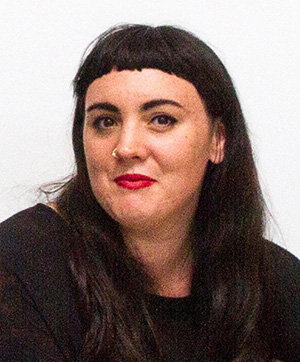
Susie Anderson is a writer and multimedia artist based in Sydney, Australia. A descendent of the Wergaia and Wemba Wemba people from north western Victoria, her practice is concerned with the distances between place and people, themes she explores through prose poetry and media based works. Susie has performed and presented widely at literary festivals and events in Australia and abroad, and in 2015 co-ran an event of collaborative poetry performances at the National Young Writers Festival in Newcastle. Selected publications include Alien She, Keep Brave, Shabby Doll House, The Lifted Brow, For Every Year and Voiceworks Magazine. Susie was a recipient of a Wheeler Centre Hot Desk Fellowship in 2014.
Susie also makes work as part of the arts collective sociocreative trust, most recently Elsewhere, an exhibition at Redrock Books & Gallery in 2015, and Speak Easy, a curated dinner and performance at the 2016 Festival of Live Art in Melbourne.
State Editor's notes
'Susie Anderson moved from Victoria to New South Wales fairly recently. She writes strikingly easygoing, relaxed prose poems. They are confessional and deceptively off the cuff – as though presenting thoughts and actions unfolding in real time. Her unaffected voice, typically keen to reveal her quirks and shortcomings to the reader, is endearing in its honesty' writes ABR's States of Poetry - New South Wales State Editor Elizabeth Allen. Read her States of Poetry introduction here.
States of Poetry
'the bus'
'egress'
Recordings
#42 States of Poetry 2016 NSW Podcast | Introduction and 'small town apocalypse' by Susie Anderson
#43 States of Poetry 2016 NSW Podcast | 'time conquers all' by Susie Anderson
#44 States of Poetry 2016 NSW Podcast | 'the bus' by Susie Anderson
#45 States of Poetry 2016 NSW Podcast | 'minimum spend' by Susie Anderson
#46 States of Poetry 2016 NSW Podcast | 'egress' by Susie Anderson
Further reading and links
Susie Anderson's Blog
Three Poems by Susie Anderson published in The Lifted Brow
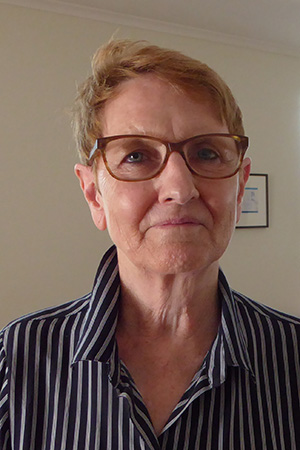
Pam Brown is a dedicated professional amateur who has published many books, chapbooks and an e-book. She has been actively involved in a diverse gamut of poetic activity since the 1970s. Pam is a contributing editor for several magazines and independent publishers, most recently, for Cordite Poetry Review. In 2014 she edited ten booklets of new transnational poetry, the deciBels series, for Vagabond Press. Vagabond published her new collection, Missing up, in December 2015. A bilingual edition of her poems, Alibis, translated into French by Jane Zemiro, was published by Société Jamais-Jamais in 2014. She lives in Alexandria in Sydney.
State Editor's notes
'Reading Pam Brown's poems is a bit like watching jazz; it can feel like she is going off on long solo improvisations. Things from the outside world – a train announcement, a sign she passes – interweave themselves with her inner melodies, and she seems to play with the sounds and rhythm of words as much as with sense and nonsense, as in this passage: "rain taxi / book thug / I ate all your bees".' writes ABR's States of Poetry - New South Wales State Editor Elizabeth Allen. Read her States of Poetry introduction here.
States of Poetry
Further reading and links
Pam Brown's Blog
Writers’ Series: Pam Brown
‘THE END’ - editorial by Pam Brown, published in Cordite Poetry Review
Gig Ryan reviews Home by Dark by Pam Brown, published in the July-August 2013 issue of Australian Book Review
Nathaniel Pree reviews Missing upin Cordite Poetry Review, January 2016
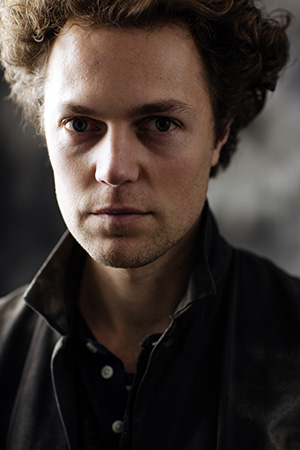
Toby Fitch is based in Newtown, Sydney. He is poetry editor of Overland and program director for the Australian Poets Festival. He also works as a bookseller at Gleebooks, a teacher of creative writing at the University of Sydney, and runs the Sappho Books poetry night. His books of poetry include Rawshock (Puncher & Wattmann 2012), which won the Grace Leven Prize for Poetry, Jerilderies (Vagabond Press 2014) and The Bloomin' Notions of Other & Beau (forthcoming, Vagabond 2016).
State Editor's notes
'Toby Fitch's poems possess an unusual physicality and form beautiful and intriguing shapes on the page. They are clever and energetic, full of word play, puns, and politics. Reading them is like sliding down a slippery dip. They are also inversions of Rimbaud's Illuminations. Another ride down the slide – this time maybe backwards' writes ABR's States of Poetry - New South Wales State Editor Elizabeth Allen. Read her States of Poetry introduction here.
States of Poetry
'In Fancy'
'Gen Y'
Recordings
#26 States of Poetry 2016 NSW Podcast | 'In Fancy' by Toby Fitch
#27 States of Poetry 2016 NSW Podcast | 'Diva Maintenance' by Toby Fitch
#28 States of Poetry 2016 NSW Podcast | 'Mauvement' by Toby Fitch
#29 States of Poetry 2016 NSW Podcast | 'Democrazy' by Toby Fitch
#30 States of Poetry 2016 NSW Podcast | 'Gen Y' by Toby Fitch
Further reading and links
Toby Fitch's website
Toby Fitch reads 'In Fancy' for Australian Book Review's Poem of the Week podcast.
'Fey' by Toby Fitch, published in the December 2015 issue of Australian Book Review
Toby Fitch reviews Drones and Phantoms by Jennifer Maiden in the April 2015 issue of Australian Book Review.
Peter Kenneally reviews Rawshock by Toby Fitch in the October 2012 issue of Australian Book Review
'Oscillations' by Toby Fitch published in the March 2012 issue of Australian Book Review
'Self-Guerre' by Toby Fitch published in the Sydney Morning Herald on June 6, 2015.
The Bloomin' Notions of Other & Beau by Toby Fitch (Vagabond Press)
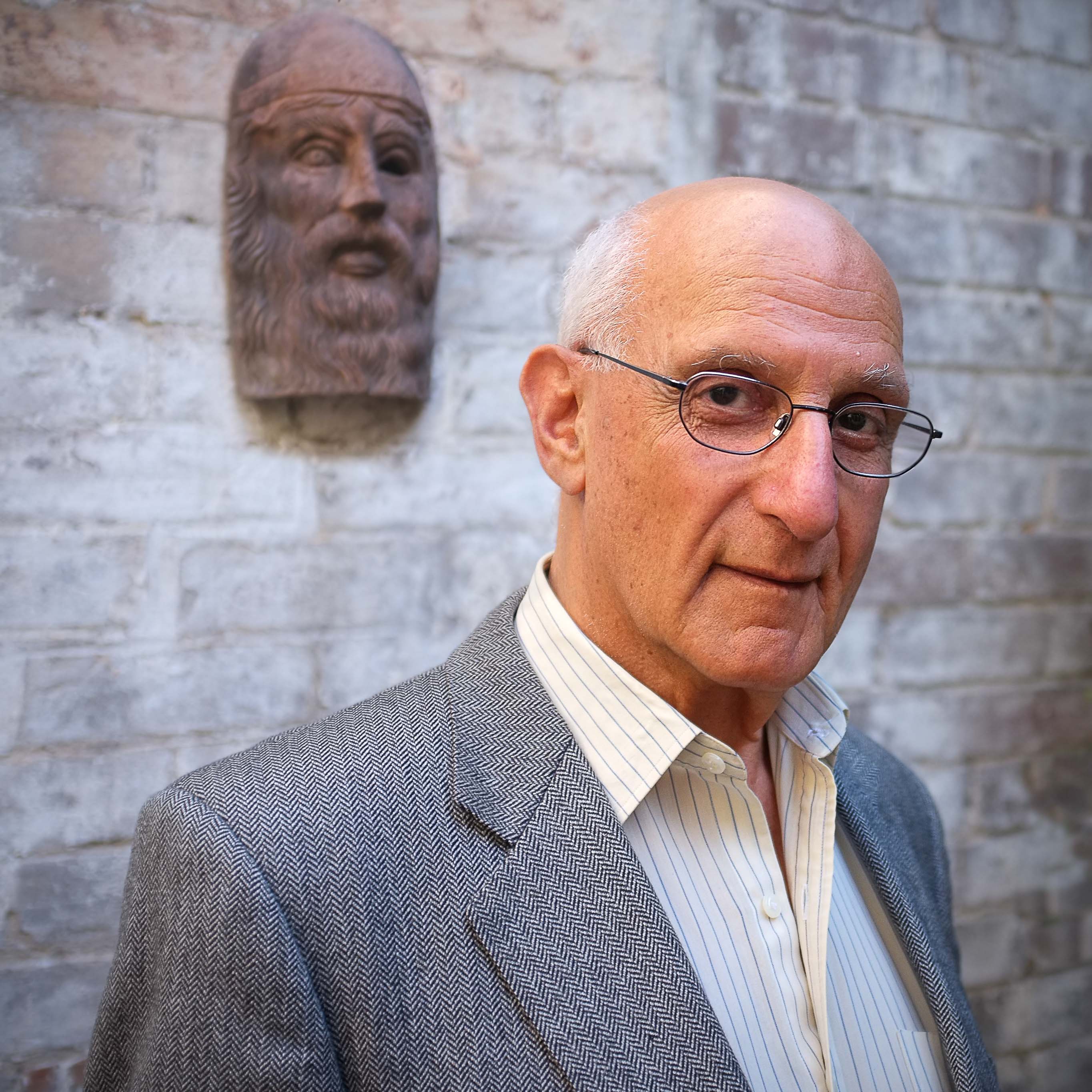
David Malouf is the internationally acclaimed author of novels including Ransom (2009), The Great World (1990) (winner of the Commonwealth Writers' prize and the Prix Femina Etranger), Remembering Babylon (1993) (winner of the IMPAC Dublin Literary Award), An Imaginary Life (1978), Conversations at Curlow Creek (1996), Dream Stuff (2000), Every Move You Make (2006) and his autobiographical classic 12 Edmondstone Street (1985). His The Complete Stories, published in 2008, won the Australia-Asia Literary Award of the same year. His most recent books are A First Place (2014) and The Writing Life (2014). He was born in 1934 and was brought up in Brisbane. David Malouf is the ABR Laureate.
State Editor's notes
'David Malouf – one of our greatest writers and Australian Book Review's Laureate – finds ways of expressing very difficult things in a way few other poets can, to "speak for what we have no other / words for". Sometimes, I see David sipping coffee under neon lights at the busy Broadway shopping centre, watching people come and go. I was pleased to able to juxtapose this mental image of him with those of his "Late Poem", a hushed and contemplative reflection on a much quieter coffee drinking experience' writes ABR's States of Poetry - New South Wales State Editor Elizabeth Allen. Read her States of Poetry introduction here.
States of Poetry
'Pyrra'
Further reading and links
David Malouf reads 'Visitation on Myrtle Street' for Australian Book Review's Poem of the Week podcast
'Being There' by David Malouf, ABC Radio National
'David Malouf: My life as a reader' The Guardian 22 May 2014
Ian Dickson reviews Fly Away Peter (Sydney Chamber Opera) for Arts Update
Luke Slattery reviews Being There by David Malouf in the May 2015 issue of Australian Book Review
Patrick Allington reviews The Writing Life by David Malouf in the March 2015 issue of Australian Book Review
Kevin Rabalais reviewsA First Place by David Malouf in the May 2014 issue of Australian Book Review
'David Malouf, Brett Dean, Richard Bell and Lucy Guerin Honoured with Australia Council Awards' Daily Review, 1 March 2016

Kate Middleton is an Australian writer. She is the author of the poetry collections Fire Season (Giramondo, 2009), awarded the Western Australian Premier's Award for Poetry in 2009 and Ephemeral Waters (Giramondo, 2013), shortlisted for the NSW Premier's award in 2014. From September 2011 to September 2012 she was the inaugural Sydney City Poet.
State Editor's notes
'In her poetry, Kate Middleton displays an intricate knowledge of many topic areas and texts. She follows her obsessions with enthusiasm and takes her willing readers along for the ride. Here she takes us into a Rubens painting, into The Wizard of Oz, and into the belly of a whale. Kate adroitly uses similes to bring together ideas which at first seem contradictory, but then make perfect sense: a lion is as "patient as an avalanche", while the ground beneath Dorothy's feet "glows like ruby / dense and knotted / as blood" writes ABR's States of Poetry - New South Wales State Editor Elizabeth Allen. Read her States of Poetry introduction here.
States of Poetry
'Jonah'
Further reading and links
Kate Middleton at Cordite Poetry Review.
'The Future of Poetry' by Kate Middleton published by Australian Poetry in 2011
Kate Middleton reviews Liquid Nitrogen by Jennifer Maiden in the February 2013 issue of Australian Book Review
Kate Middleton reviews Naked Clay: Drawing from Lucian Freud by Barry Hill in the July-August 2012 issue of Australian Book Review
Kate Middleton reviews and then when the by Dan Disney in the June 2012 issue of Australian Book Review
Kate Middleton reviews The Best Australian Poems 2011 edited by John Tranter in the February 2012 issue of Australian Book Review
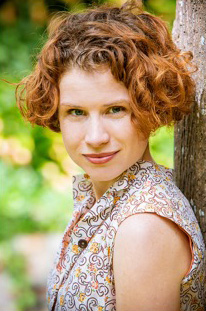
Fiona Wright is a writer, editor and critic from Sydney. Her poetry collection, Knuckled, won the 2012 Dame Mary Gilmore Award, and her book of essays Small Acts of Disappearance was published by Giramondo in 2015. She has recently completed a PhD at Western Sydney University's Writing & Society Research Centre.
State Editor's notes
'Fiona Wright's poems are open; I like that about them. Her voice – sometimes vulnerable – is often gentle and strong at the same time. Everyday images become quite surreal in her poems. For instance, in 'Crisis Poem', she takes a satirical look at gender stereotypes, which adds a strange twist to an otherwise 'normal' backyard barbeque' writes ABR's States of Poetry - New South Wales State Editor Elizabeth Allen. Read her States of Poetry introduction here.
States of Poetry
Recordings
States of Poetry 2016 - New South Wales Podcast | 'After Mutability' by Fiona Wright
States of Poetry 2016 - New South Wales Podcast | 'Crisis Poem' by Fiona Wright
States of Poetry 2016 - New South Wales Podcast | 'Potts Point' by Fiona Wright
States of Poetry 2016 - New South Wales Podcast | 'Set Piece' by Fiona Wright
States of Poetry 2016 - New South Wales Podcast | 'Smith's Lake' by Fiona Wright
Further reading and links
'Autumn Poem' by Fiona Wright in Overland (issue 220, Spring 2015)
'Vibrations' by Fiona Wright (published February 2014, Cordite Poetry Review)
Emily Laidlaw reviews Small Acts of Disappearance by Fiona Wright
Fiona Wright reviews Thirty Australian Poets by Felicity Plunket (ed.)
Rose Lucas reviews Knuckled by Fiona Wright
Editing an anthology of poets from New South Wales is both a wonderful and confronting task. Wonderful because you get to spend close-reading time with the work of poets that you greatly admire; confronting because of all the excellent poets you might include. However, one can take comfort in the fact that this anthology is going to be an annual occurrence, and in that sense cumulative, with a new cohort of six poets each year. I look forward to seeing it unfolding over time in its various iterations, and I feel honoured to present this inaugural collection.
The poetry included here has a certain quality in common: it unsettles the reader's relationship to language and to everyday phenomena; and it generates new and unexpected perceptions and imaginings. I have also chosen poets who contribute to the broader poetry community as teachers, editors, mentors, reviewers, and/or event organisers.
Here are six New South Wales poets I wanted to share with you. I hope you enjoy living with them as much as I do.
Toby Fitch's poems possess an unusual physicality and form beautiful and intriguing shapes on the page. They are clever and energetic, full of word play, puns, and politics. Reading them is like sliding down a slippery dip. They are also inversions of Rimbaud's Illuminations. Another ride down the slide – this time maybe backwards.
Fiona Wright's poems are open; I like that about them. Her voice – sometimes vulnerable – is often gentle and strong at the same time. Everyday images become quite surreal in her poems. For instance, in 'Crisis Poem', she takes a satirical look at gender stereotypes, which adds a strange twist to an otherwise 'normal' backyard barbeque.
David Malouf – one of our greatest writers and Australian Book Review's Laureate – finds ways of expressing very difficult things in a way few other poets can, to 'speak for what we have no other / words for'. Sometimes, I see David sipping coffee under neon lights at the busy Broadway shopping centre, watching people come and go. I was pleased to able to juxtapose this mental image of him with those of his 'Late Poem', a hushed and contemplative reflection on a much quieter coffee drinking experience.
Susie Anderson moved from Victoria to New South Wales fairly recently. She writes strikingly easygoing, relaxed prose poems. They are confessional and deceptively off the cuff – as though presenting thoughts and actions unfolding in real time. Her unaffected voice, typically keen to reveal her quirks and shortcomings to the reader, is endearing in its honesty.
Reading Pam Brown's poems is a bit like watching jazz; it can feel like she is going off on long solo improvisations. Things from the outside world – a train announcement, a sign she passes – interweave themselves with her inner melodies, and she seems to play with the sounds and rhythm of words as much as with sense and nonsense, as in this passage: 'rain taxi / book thug / I ate all your bees'.
In her poetry, Kate Middleton displays an intricate knowledge of many topic areas and texts. She follows her obsessions with enthusiasm and takes her willing readers along for the ride. Here she takes us into a Rubens painting, into The Wizard of Oz, and into the belly of a whale. Kate adroitly uses similes to bring together ideas which at first seem contradictory, but then make perfect sense: a lion is as 'patient as an avalanche', while the ground beneath Dorothy's feet 'glows like ruby / dense and knotted / as blood'.

